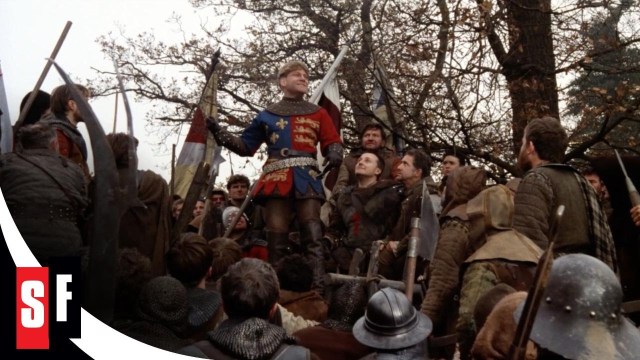
Today is Veteran’s Day, commemorating the end of the War to End All Wars. If you don’t know much about World War I, I strongly recommend two books: Barbara Tuchman’s Guns of August, nonfiction about how we got from the end of 1910 through the first 30 days of the war; and Jeffrey Shaara’s, To the Last Man, a fictional account that shows how people from the bottom to the top of the military and political establishments throughout Europe on both sides made the devastating and heroic and deadly decisions that the war forced on them
War is a bizarre human endeavor that brings out the worst and the best of the people engaged in it on both sides. And our poets help us make sense of it. So in the troubled days ahead of us now (please, God, not including war), when you feel embattled and outnumbered, remember what Shakespeare gave us in Henry V, Act IV Scene III: 18-67.
WESTMORELAND. O that we now had here
But one ten thousand of those men in England
That do no work to-day!
.
KING. What’s he that wishes so?
My cousin, Westmoreland? No, my fair cousin;
If we are mark’d to die, we are enow
To do our country loss; and if to live,
The fewer men, the greater share of honour.
God’s will! I pray thee, wish not one man more.
.
By Jove, I am not covetous for gold,
Nor care I who doth feed upon my cost;
It yearns me not if men my garments wear;
Such outward things dwell not in my desires.
.
But if it be a sin to covet honour,
I am the most offending soul alive.
No, faith, my coz, wish not a man from England.
.
God’s peace! I would not lose so great an honour
As one man more methinks would share from me
For the best hope I have. O, do not wish one more!
Rather proclaim it, Westmoreland, through my host,
That he which hath no stomach to this fight,
Let him depart; his passport shall be made,
And crowns for convoy put into his purse;
We would not die in that man’s company
That fears his fellowship to die with us.
.
This day is call’d the feast of Crispian.
He that outlives this day, and comes safe home,
Will stand a tip-toe when this day is nam’d,
And rouse him at the name of Crispian.
.
He that shall live this day, and see old age,
Will yearly on the vigil feast his neighbours,
And say “To-morrow is Saint Crispian.”
.
Then will he strip his sleeve and show his scars,
And say “These wounds I had on Crispin’s day.”
Old men forget; yet all shall be forgot,
But he’ll remember, with advantages,
What feats he did that day. Then shall our names,
Familiar in his mouth as household words—
Harry the King, Bedford and Exeter,
Warwick and Talbot, Salisbury and Gloucester—
Be in their flowing cups freshly rememb’red.
.
This story shall the good man teach his son;
And Crispin Crispian shall ne’er go by,
From this day to the ending of the world,
But we in it shall be remembered–
We few, we happy few, we band of brothers;
For he to-day that sheds his blood with me
Shall be my brother; be he ne’er so vile,
This day shall gentle his condition;
And gentlemen in England now a-bed
Shall think themselves accurs’d they were not here,
And hold their manhoods cheap whiles any speaks
That fought with us upon Saint Crispin’s day.